Immigration 9
Some truths about illegal migration by Cubans

Some truths about illegal migration by Cubans
In view of the right of people to migrate, our country has managed, gradually, to put in order the legislation in force. Cubans can travel to any part of the world, if they comply, logically, with the regulations established by other countries.
March 30, 2022 20:03:37
Translated and edited by Walter Lippmann for CubaNews.
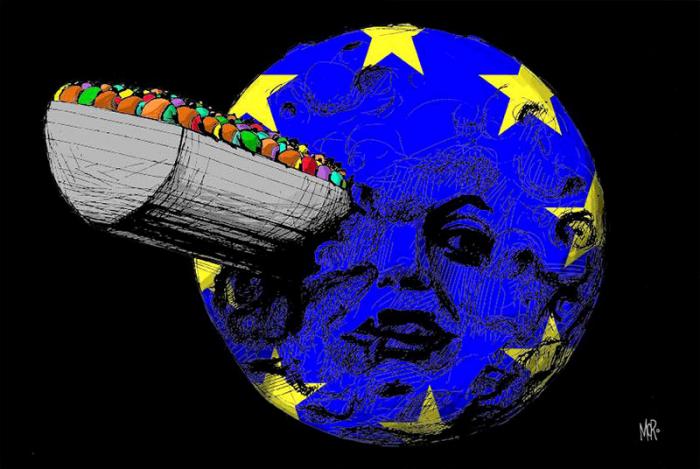
Human migrations date back to time immemorial. So much so that many theories suggest that, thanks to them, it was possible to populate different regions of the planet.
Although the reasons for migrating are diverse, they are generally due to the search for better living conditions. That is why wars, extreme poverty or the complexity of the economic, individual or social environment are triggers for this phenomenon.
Although there are global efforts to promote legal and orderly migration, and to recognize and respect the guarantees and rights of those who make this decision, regardless of their legal status, we are still far from achieving this.
There is no consensus on this issue and, therefore, irregular and disorderly migration is today a latent problem whose solution is not yet on the horizon.
CUBA, AN EXCEPTIONAL CASE?
In view of the right of people to migrate, our country has gradually managed to put in order the legislation in force. Cubans can travel anywhere in the world, if they comply, logically, with the regulations established by other nations.
But what makes Cuba an exceptional case in terms of immigration? The answer is well known. For decades, in their eagerness to destabilize the revolutionary process, to build the myth of its “inefficiency” in terms of the standard of living offered to the people, and to create before the world the idea that this is a country in decline, successive U.S. governments have hindered the legal channels for the emigration of Cubans to that nation.
On the other hand, they promote special regulations for those born on the Island, thus stimulating both the illegal departure of Cubans and their attempt to reach that nation by means of the dangerous routes that involve several countries of the continent.
The reestablishment of diplomatic relations between the U.S. and Cuba, during the mandate of Barack Obama, and the reopening of its Embassy in Havana, gave a certain change of color to the matter, even though the agreed number of visas was never reached. However, Donald Trump’s administration reversed everything that had been achieved, and went so far as to suspend consular services and force Cubans to travel to other countries to apply for their visas.
His successor, Joe Biden, has maintained the line of action regarding Cuba, and although he recently announced that certain procedures at the Embassy would be resumed, it does not seem that things will change much.
Such circumstances, together with the economic difficulties generated by the terrible pandemic-blockade duet, stimulated the departure from the country of thousands of Cubans who, although they leave the archipelago legally, once in the stopover country, become illegal migrants in order to reach the USA at the mercy of extortion and extortion.
AT THE MERCY OF EXTORTION AND HUMAN TRAFFICKING
Since the triumph of the Revolution in 1959, Cuba has been a pillar in the fight to eradicate human trafficking. It is a crime severely punished in the largest of the Antilles, while in much of the world it is still a very profitable business and, of course, irregular migrants immediately become a highly vulnerable group.
Although it is sad to admit it, in our continent operate dissimilar networks dedicated to the trafficking of human beings. Perhaps the best known figures within this dark web are the so-called coyotes, whose function is basically to outwit or bribe the authorities, and drive migrants through border crossings.
These groups, outside of any law, move exclusively for monetary interests, without any commitment to the people they drive. Therefore, if they get lost, they are capable of abandoning, handing over and, in the worst case, but no less frequent, murdering their companions.
Therefore, once the illegal transit route begins, these are the people in whose hands our nationals find themselves. Have Cubans been swindled, intimidated, suffered from rape to other physical aggressions, have been threatened and some have been murdered? Yes. That is the risk they run, and it is, many times, the high price they pay.
WHERE DOES THE MONEY COME FROM?
It is incredible how the obsession to “leave” robs people of their common sense. Logically, a journey of this magnitude needs economic support, since it begins with the request for the necessary documentation, the purchase of the ticket and then, of course, the payment to those who guide the transit.
To pay for the project, there are those who sell everything and get rid of practically all their belongings, often at lower prices, to save time. Since there is no certainty of completing the trip, many have found themselves in the difficult situation of returning and having literally nothing.
On the other hand, faced with the impossibility of legally reclaiming their relatives, Cubans living abroad assume the cost of a trip that is, by all accounts, uncertain.
The amount of money, in turn, determines the conditions of the journey. Therefore, some have better guarantees of transportation, food, even lodging, while others must face, for example, the real possibility of being swallowed up by the Darien jungle in Panama.
The truth is that, whatever the amount, I don’t think it will ever pay the value of life.
CUBA IS ALWAYS IN THE HEADLINES
The migratory issue does not escape the constant media attack to which our country is subjected. That is the reason why, although thousands of Latin Americans undertake the same journey every day, they do not grab the headlines that Cubans do.
As it is to be expected, none of those headlines begins by saying, for example: “Unilateral measures of the United States incite illegal migration of Cubans”. Of course not.
The most common, sensationalist and malicious ones are focused in ways such as: “Cubans flee desperate for the prevailing situation on the Island”, or “Cubans prefer to be swallowed by the Darien before continuing to live in their country”.
This serves to understand that nothing escapes manipulation when it comes to our country, and that always, whatever the causes of a problem may be, blaming the socialist system or the Revolutionary Government will be the preferred hypothesis.
TO EMIGRATE OR NOT TO EMIGRATE?
It would be naïve and false to deny that Cuba is living today a complex situation. Undoubtedly, the necessary battle against the pandemic, aggravated by such a criminal policy as the blockade, prevented the achievement of objectives aimed at giving a new breath of fresh air to the Cuban economy.
However, it is very unfair to say that this has happened because of the government’s inability or lack of political will and efforts to move forward. It is also uncertain that there is a critical situation in Cuba, to such an extent that it forces its citizens to flee, in the same way as those who flee, for example, from a war.
Inflation, yes, price speculation, shortages, all this is real, as is the fact that basic services essential for the people were never stopped, that the standard family basket of goods was never not distributed fairly, that no hospital was closed, that there were no massive layoffs, that the private sector was protected from the bankruptcy of its businesses, that it has been vaccinated, at no cost to the people.
The decision to leave, even at the risk of one’s life, is an individual one, it is up to the free will of each person. Everyone has their own reasons and no one intends to question them.
It is worth mentioning that this Island does not close its doors to its children; therefore, those who decide to return may do so.
Some have told their story. Others will never have the courage to narrate their experiences, and those who arrive will rarely talk about the dark side of their journey.
On top of all that, there is a reality. Sometimes, what seems little to some can be the greatest of riches to others. Some pursue the American dream, while, for the vast majority, Cuba is the greatest of dreams.
IN CONTEXT:
THE U.S. IS IN BREACH OF ITS LEGAL OBLIGATION. The US fails to comply with its legal obligation to grant no less than 20,000 visas annually, imposes the burden of the brutal economic blockade and pressures governments in the region to demand transit visas for Cuban migrants and travelers.
The Cuban side has repeatedly warned the U.S. government of its responsibility – which it has unilaterally and unjustifiably failed to fulfill since 2017 – to facilitate regular, safe and orderly emigration.
The United States has been pressuring governments in the region for weeks to take measures against the Cuban traveler, in a cynical effort to close the doors to the emigration it has encouraged for decades.
In its eagerness to use the Cuban population as a “hostage of its hegemonic ambition”, the U.S. violates the human rights of our citizens and maintains a destabilizing policy against Cuba that violates International Law.
SOURCE: Twitter of Bruno Rodríguez Parrilla, Minister of Foreign Affairs.
Why No Social Outbursts in Cuba?


FROM THE LEFT
Why are There No Social Outbursts in Cuba?
Despite the intense propaganda to which the US allocates tens of millions of dollars each year, the results are overwhelmingly favorable to the revolutionary leadership that Washington has been trying to overthrow for six decades
Author: Iroel Sánchez | internet@granma.cu
November 2, 2020 02:11:30
Translated and edited by Walter Lippmann for CubaNews.
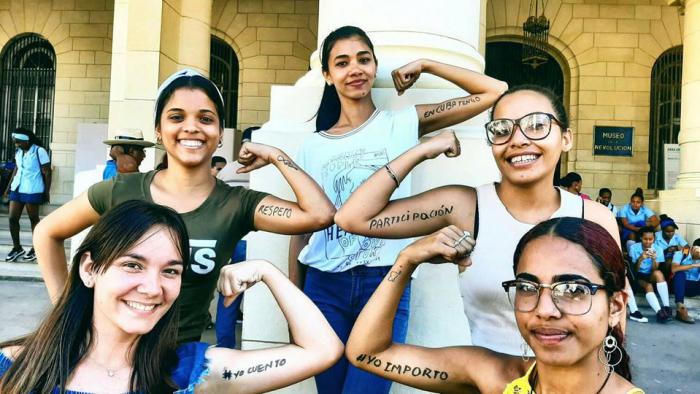
Young people
Photo: Taken from Karla Santana’s Facebook profile
A Brazilian friend who, as a journalist, was in Cuba for a few days, told me of her amazement at how all the Cubans she spoke to know who Bolsonaro is, who Dilma is and who Lula is, which was not the case in other Latin American countries she had visited recently.
The exceptional interest with which Cubans follow international events is something very particular that often goes unnoticed by those of us who live on the island. The social upheavals in Haiti, Chile, Panama and Ecuador, the conflict of powers in Peru, the endless repressions and assassinations of social leaders in Honduras and Colombia, the inherited ungovernability that forced the Mexican government to release a drug trafficker, the unjust imprisonment suffered by the leader of the Brazilian left to prevent his safe electoral victory and the elections in Bolivia and the United States, or Washington’s constant aggressions against Venezuela, can be topics of conversation anywhere in Cuba, from a corner where dominoes are played to a university classroom.
Of course, these conversations do not avoid the serious difficulties that the Cuban economy is going through, against which every week new US government sanctions are announced, nor any of the deficiencies in services with which the citizenry clashes. In these, the impact of the economic blockade can be mixed with bureaucratic laziness and cause discomfort and dissatisfaction.
However, this mixture of economic warfare with internal shortcomings does not cause social upheavals, and when the system – single-party socialism – has been put to the test at the ballot box, as in the recent constitutional referendum. This is so, despite the intense propaganda to which the US spends tens of millions of dollars each year and a well-funded “Cuba Internet Task Force”. The results have been overwhelmingly favorable to the revolutionary leadership that Washington has been trying to overthrow for six decades.
The explanation for the dominant media machine is that the mix of “intense regime repression” and “Cuban relaxation” prevents an outbreak. But in the history of Cuba –from Weyler’s reconcentration to Machado’s dictatorship to Batista’s– no regime based on repression has ever managed to remain in charge of the country for a long time, despite a “relaxation” in which corruption was the dynamic of the functioning of politics and the economy at all levels.
On the contrary, if instead of February 2019, the electoral consultation were to take place now, in the midst of an intensified blockade, the percentage of approval would probably exceed that obtained then, and that would be the result, without a doubt, of the combination of three conjunctural and two structural factors.
Conjunctural factors:
-
The intensification of the U.S. government’s aggressiveness strengthens patriotic sentiment and national unity.
The political effectiveness of the Cuban government, convincingly explaining the relationship of shortages with the increase in aggression, and the way in which the strategy to confront the US sanctions seeks to lessen their impact on the daily life of the people.
-
The international situation with visible failure of neo-liberal policies and discrediting of the formulas of bourgeois democracy
Structural:
-
The massive political culture among Cubans, established for 60 years by Fidel Castro’s teaching, about the nature of imperialism and the project of social justice and national sovereignty of the Revolution.
-
The link between the revolutionary leadership and the people, continued by the leadership of Raúl and supported by Díaz-Canel, which has reinforced the perception that the government listens to the people and works for them.
-
No Latin American country, of those who right now repress social protest with gunshots and gases and/or openly violate the rules of formal democracy that they themselves defend, has been subjected to economic warfare, to multi-million dollar financing to create an artificial opposition and, much less, to permanent global media and academic lynching of their leaders and their political and social project.
But in spite of all that, it must be recognized that there are dissatisfied people in Cuba, and many of those dissatisfied people are going to Miami. The accumulation of almost six decades of migratory privileges, together with the development of educational capabilities and the state of health brought about by Cuban socialism, make them very competitive with respect to the rest of the non-native communities, but they do not make them freer. More than one million Cubans in the US suffer serious limitations in their relations with their families in Cuba thanks to Trump’s measures; however, there is no news that this causes significant protests there.
Nor do we read anywhere that this public absence of disagreement is attributed to corruption and the repressive practices, not at all democratic, that the ruling class on the island until 1959 seems to have implanted in Miami during its already long stay in that city. This is not to disregard the uplifting example offered by a system that today puts Donald Trump and Joe Biden in competition, in corruption and insults.
Cuba Returns 2000+ Stranded Cubans


Cuba guarantees the return of more than two thousand Cubans stranded in 15 countries
Since the beginning of the spread of the pandemic, Cuban Consulates have provided timely information to Cuban nationals abroad on the evolution of the disease on the island and on consular procedures.
April 27, 2020
Translated and edited by Walter Lippmann for CubaNews.
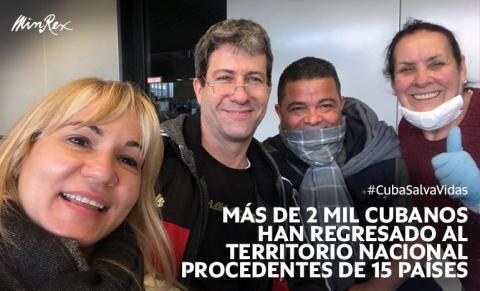
Photo: Cubaminrex
Since the announcement of the regulations on travel to and from Cuba, a measure adopted by the Cuban authorities as part of the national plan for the prevention and confrontation of COVID-19 as of March 20, more than 2,000 Cubans have returned to national territory, by air and sea, from more than a dozen countries, among them: Angola, Barbados, Dominican Republic, Guatemala, Guyana, Haiti, Honduras, Italy, Nicaragua, Peru, Portugal, Mexico, Panama and Equatorial Guinea, Cubaminrex reported.
These return flights of Cuban citizens and foreigners residing on the island have been organized between the competent Cuban authorities and their counterparts in each of the countries involved, in strict compliance with internationally established standards.
Since the beginning of the spread of the pandemic, Cuban Consulates have provided timely information to Cuban nationals abroad on the evolution of the disease on the Island and on consular procedures. At the same time, the Cuban authorities are permanently monitoring the situation of our nationals stranded in different countries, while efforts are being made, whenever possible, to ensure their return to our country.
Equally commendable has been the action of Cuban residents and members of solidarity organizations with Cuba, who have provided food, medicines and arranged cheap accommodations for Cuban citizens who are waiting to return to our national territory.
Motives for Emigration to the US
Motives for Emigration to the U.S.

By Manuel E. Yepe
http://manuelyepe.wordpress.com/
Exclusive for the daily POR ESTO! of Merida, Mexico.
Translated and edited by Walter Lippmann.
The determining ideology in the “First World” defends the free movement of goods and capital but emphatically excludes the possibility of the labor force enjoying that same freedom. It condemns all governmental action in poor countries to protect their products from the effects of an unequal confrontation in the external market. However, it rejects the possibility of the international displacement of labor according to the same law of supply and demand that they claim for their own goods, capital and other factors of production.
In conditions of absolute freedom of movement of goods in the world market, the winner is the one who produces at the lowest cost.This can only be achieved with higher productivity, which is always the one to which the large corporations of developed countries have access through more efficient technology born of their financial superiority. This leaves the poor countries with cheap labor as their only resource to compete.
A genuinely liberal economic globalization, which upholds the principle of competitiveness and fixes in the market the possibilities of all parties, should include the freedom of movement of all factors of production. This would include the labor force, but this possibility is not even mentioned in neoliberal discourse.
In Latin America, the fundamental receiving pole of commercial exchanges, the United States, closes its borders to spontaneous immigration promoted by the laws of the market. It projects programs aimed at attracting immigrants with specific qualifications or political refugees (real or supposed) that suit its political purposes of domination, ignoring the obvious fact that the economy of the United States objectively needs labor, especially unskilled labor.
Such inconsistency reflects the will to avoid conflicts derived from competition between immigrants and their own workers, without forgetting the manifestations of xenophobia and discrimination against minorities that are manifested in that society, due to multiple historical factors.
From the point of view of the U.S. business which exploits immigrant labor, although their interests in the legal prohibition of immigrant income are affected, the continued income of undocumented workers – with depressed rights – solves their needs. The big losers are the undocumented, persecuted, mistreated and super-exploited immigrants. Emigration to the United States becomes the dominant fact of the regional migratory panorama.
But since the last decades of the 20th century, the Latin American and Caribbean migratory process, which from the time of the conquest until then had left a positive balance, has become negative. That is to say, more emigrants than immigrants.
In the 1980s, with the rise of neoliberalism promoted by Ronald Reagan’s government in the United States, Latin America, like the entire Third World, entered a new period. It is characterized by the effects of an unpayable foreign debt that hindered its development, aggravated by the rise of corruption, embezzlement and the discrediting of traditional politicians.
The collapse of the Soviet Union and the socialist system in Eastern Europe deprived the world’s underdeveloped countries of an alternative of economic and technical assistance, as well as relatively safe and advantageous markets.
The rich countries took advantage of the conjuncture to impose a neoliberal orientation on the objective trend towards globalization that technological advances determine for the economy of nations. They then reduced development assistance, forced the weakening of state apparatuses, the de-statification of natural resources and the privatization of state enterprises, preferably through their acquisition by U.S. corporations.
Thus, Latin America, which for centuries was a recipient of migration, became a region of emigrant outflow. Tens of millions of Latin Americans have been forced to emigrate in the last twenty years. All this has led to a sharp increase in inequalities and the concentration of wealth in a small number of people and entities in Third World countries.
England, when its fleet was the largest and most efficient in the world, demanded freedom of the seas without protection measures that would raise the competitiveness of the fleets of other countries. Today, the highly developed countries demand freedom of movement fpr their goods and capital, without barriers that protect the production of countries with less economic development. But they do not include that freedom for the workforce.
September 16, 2019. This article may be reproduced by quoting the newspaper POR ESTO as the source.
Cubans Deported from Mexico

Fifth Flight with Cubans Deported from Mexico Arrives in Havana
April 17, 2019
Translated and edited by Walter Lippmann for CubaNews.
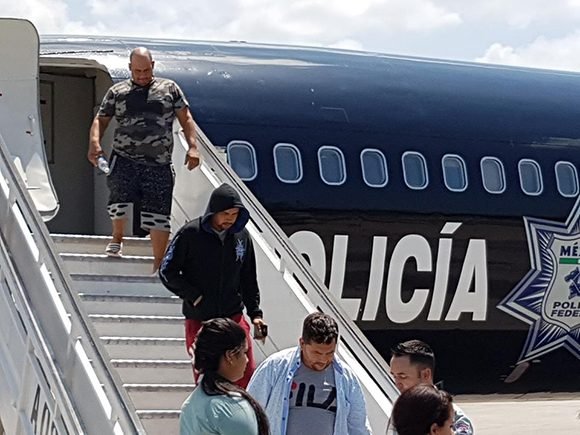
In less than a month, approximately 300 Cubans arrived on the island in five deported flights. Photo: Talia Gonzalez/ Facebook.
A new group of Cuban citizens deported from Mexico arrived in Havana on Wednesday as part of the migration agreements between the two countries.
The Mexican Federal Police aircraft landed at José Martí International Airport with people who had left the island legally, but became irregular migrants on their way to Mexico.
In less than a month, approximately 300 Cubans arrived on the island in five flights of the deported, many of them with anecdotes of vicissitudes and outrages suffered during their route through South and Central American countries bound for the United States.
As in previous cases, these human beings will return to their families after receiving the necessary attention, including health care, said immigration authorities, but said that those who left accounts pending with the legal system before leaving must face it.
The Cuban government took advantage of this situation to insist on its call for regular, orderly and safe emigration, in order to prevent people from becoming victims of criminal groups linked to human trafficking in the region.
The scenario has been complicated in recent months by the escalation in the aggressiveness of the U.S. government against the island, which includes the politicization of the flow of Cubans between both sides of the Florida Strait.
Recently, Washington reduced the period of validity of the B2 visa for Cubans from five years to three months, with only one entry, under the pretext of an alleged reciprocity with Cuba’s treatment of Americans.
Havana, through its Foreign Ministry, rejected the decision, describing it as ‘an additional obstacle to the exercise of the right of Cuban citizens to visit their relatives in that country’.
This measure adds to the closure of the services of the United States Consulate in Havana, to the unjustified interruption of the granting of visas to Cubans, forcing them to travel to third countries without any guarantee, and to the failure to comply with the visa quota established by the migratory agreements, he stressed.
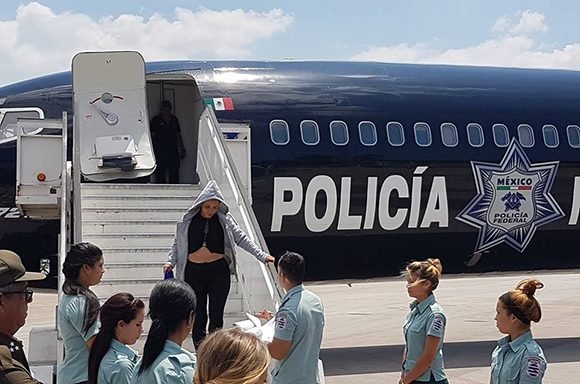
In less than a month, approximately 300 Cubans arrived on the island in five deported flights. Photo: Talia Gonzalez/ Facebook.
With information from Prensa Latina.
Double Standards on Immigration

Double Standards on Immigration to the US.
Published: Monday, November 19, 2018 | 08:47:39 pm.
By Lázaro Fariñas

Translated and edited by Walter Lippmann for CubaNews.
Think about the comments made by the American extreme right and, therefore, the Miami anti-Cuban right, about the famous caravan of migrants approaching the southern border of the United States. They bring to my memory that verse of the poet Campoamor in which he says: “And it is that in the traitorous world/ there is neither truth nor lie, / everything is according to the color/ of the glass with which one looks”.
Remember. more or less two years ago, Cubans who had left Cuba legally and who were residing in different South American countries began to advance through Central America with the idea of arriving in the United States? In order to be able to take advantage of the famous Cuban Adjustment Act. The right-wing made statements about a supposed humanitarian crisis. Those Cubans were fleeing, according to them, from the “Cuban communist dictatorship”, and that those compatriots only had the desire to reach “lands of freedom” in order to find the famous American dream.
Very selectively, the same people who described Cubans in Central America as people who pursued the American dream, now accuse the migrants who approach the border with Mexico of being a gang of thieves, criminals, drug traffickers and the sick. They supposedly came exclusively with the idea of murdering, stealing and infecting the citizens of this country (the US). What do you think? A humanitarian crisis in one case and an invasion by criminals in the other.
That caravan is made up of those who have been coming for years, people who flee poverty in search of better living conditions. The constant stream of migrants has never stopped. The difference is that in these moments they have come together to make the journey in larger groups. Perhaps they hope to gain more publicity for their attempt to reach the United States. Hostility is what they have received, not a compassionate welcome like that of the Cubans two years ago, but a negative and demonized one.
Those people who arrive and those who for years have been arriving, come from countries where everything exists that, since the very day of the triumph of the Revolution, the US right-wing have asked of Cuba. These include a multiparty system, market economy, representative democracy, with elections every four years, freedom of the press, etc. And if all that exists in their countries and if by implementing it all problems are solved, we have to ask ourselves, why do they emigrate? Why do they abandon the paradise that should exist in their countries since their social, economic and political system is the one that, according to the right, must prevail in all nations so that progress, wealth and social development can exist?
Obviously, the fact is that there is a multi-party system does not solve anything, but it does create a lot of politicking, corruption and demagogy. Freedom of the press only guarantees that those who have money can control the media to defend their interests. Those who believe that the market should be allowed to regulate everything, if not they are dreaming, at least they are sleeping, since even in the most developed countries there are control mechanisms over it. Representative democracy has shown time and again that it does not represent anyone in the long run. Although, well, it does represent the sectors that in one way or another control power, be it the army, the oligarchy or the political parties.
The poor wretches who come in caravan for the United States were taken as an electoral campaign flag by the Republican right. The President got tired of scaring the voters, telling them that a real invasion of thugs was coming, with the idea of them going to the polls in support of the candidates of the Republican Party. So much so that, starting from election day itself, the man stopped talking about the imminent dangers represented by the arrival of the caravan. Even the army was mobilized to the border and there this part of the troops are waiting for the supposed unarmed invaders to arrive.
The control of a country’s borders is normal and it is a duty of the government. It is true that no one has the right to enter illegally into a nation that is not their own, but what should not be done is to politicize immigration and to let some in and not let others in, only because it suits them politically.
Even now, after the policy of dry feet, wet feet, has been abolished, Cubans are subject to the same treatment as the other peoples of Latin America, since there is still the famous Cuban Adjustment Act, which makes Cubans different and privileges us only for political reasons Why? Oh because, and we have to go back to poetry, “everything is according to the color of the glass with which one looks”.
Trump Administration’s Child Abuse
The Trump Administration’s Child Abuse in the US

By Manuel E. Yepe
http://manuelyepe.wordpress.com/
Exclusive for the daily POR ESTO! of Merida, Mexico.
Translated and edited by Walter Lippmann.
The Trump administration is holding 1,500 teens and pre-teens between the ages of 10 and 17 in captivity. Some were captured and separated from their parents along the Mexican border.
This was reported by the Salt Lake Tribune, stating that they were being held in an old abandoned Walmart that was renovated with classrooms, recreation centers and medical examination rooms to house children in federal custody. Children are allowed two hours of free time each day, including one hour of physical exercise and one hour of free time. There are two separate learning shifts due to the high number of children in the institution.
In the old 250,000 square foot supermarket (just over 23,000 square meters) 313 bedrooms were adapted, with no interior ceilings or doors, where children are forced to lie on their beds all the time. Although according to reports from the newspaper, they are being well fed, many of the young people consulted by the media testified that “the food was terrible and everyone was complaining about it”.
It is assumed that most of the teenage children entered the United States alone, but it can be ensured that the younger children were forcibly separated from their parents at the border under the new Trump zero tolerance policy for immigration. It requires a referral to criminal justice of anyone caught illegally crossing the border for, a decision that has resulted in the separation of a large number of children from their families.
“If you cross the border illegally, even if you do it for the first time, we’re going to prosecute you,” Jeff Sessions told the Association of State Criminal Investigation Agencies in May.
“If you are dealing with a child, we will prosecute you, and that child will probably be separated from you, as required by law. If you don’t want your child to be separated, then don’t take him or her illegally to the other side of the border.
“We’re trying to do the best we can to take care of these children. Our ultimate goal is to reunite the children with their families,” he said. “We are not a detention center. … What we operate are childcare shelters. There’s an extremely big difference.
According to federal officials, in the two weeks following U.S. Attorney General Jeff Sessions’ announcement of the separation policy, 638 adults accompanied by 658 children were prosecuted.
It has not been explained whether other centers like these are operating in other parts of the country to imprison children in detention camps> It is known that Jeff Sessions ordered all federal prosecutors to bring criminal charges against all women detained for crossing the border illegally.
According to the Associated Press, which analyzed the Department of Homeland Security’s records, 1,995 children were separated between April 19 and May 31 of the year in question because of the new strong immigration policies.
Politically cornered by the widespread outrage that caused the forced removal of thousands of parents and children, Trump signed an executive order on June 21 to put an end to this course of action, which he had previously described as inevitable.
But as those comparisons continued, other signals to the Trump government from international organizations also emerged.
The UN High Commissioner for Human Rights expressed deep concern about the “cruel practice” of separating children from their parents by force.
“The idea that any state should try to deter parents from migrating by inflicting such abuse on children is inconceivable,” the UN High Commissioner for Human Rights, ZeidRa’ad Al Hussein, said at a session of the Council he heads.
Amnesty International’s director for the Americas, Erika Guevara-Rosas, said that “these acts meet the definitions of torture under U.S. and international law” because of the mental harm they cause to families for coercive purposes.
Trump responded to the allegations with a peculiar defense of his government’s policy, suggesting that adult migrants arrested at the border could be murderers and thieves. He also accused the Democratic opposition of being obstructionist and being primarily responsible for the separation of families in the United States.
June 28, 2018.
Immigrants’ Voices Heard
La Opinion (Los Angeles, California)
Immigrants’ voices heard on International Women’s Day
They demand respect, they’re not afraid, but they also demand no end to fighting for their rights.
By Araceli Martínez Ortega. Reporter for the newspaper La Opinión since 2006.
March 8, 2018
Translated and edited by Walter Lippmann for CubaNews
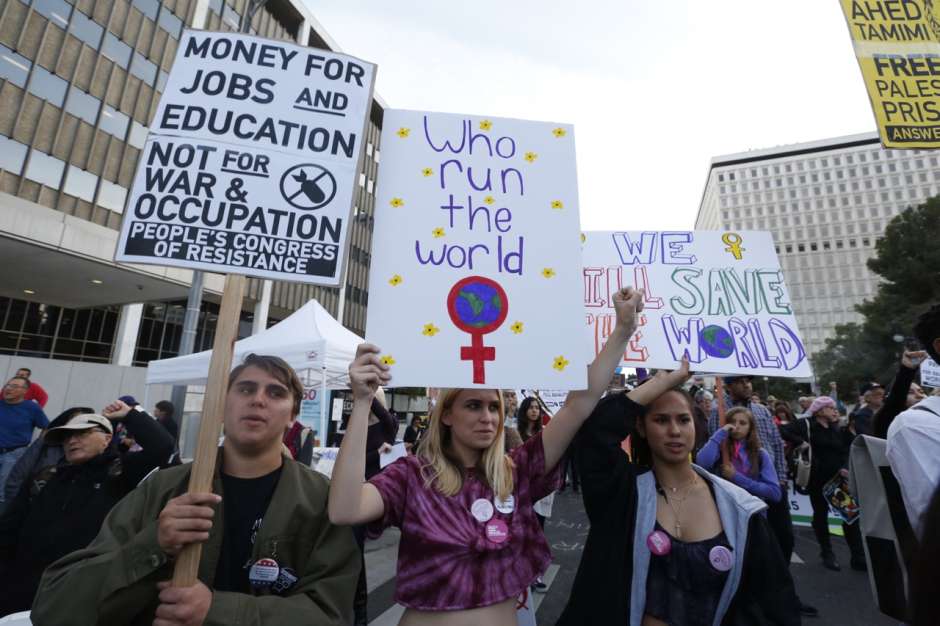
Hundreds gathered in downtown Los Angeles. Photo: Aurelia Ventura.
Alondra Becerra, a young university student of the English literature career, a dancer, and who has two jobs, one as a waitress and the other serving coffee, took time on her busy schedule to attend and lead a march in downtown Los Angeles to celebrate International Women’s Day.
“I’m here for my mom who raised me as a single, sick mother. She is a Mexican immigrant who inspired me to fight for people. I am here for mothers and women who do not know that they have rights and do not go out to fight. For them, I’m here,” Becerra said as she stood in front of the marchers with a long blanket that read “International Women’s Strike.
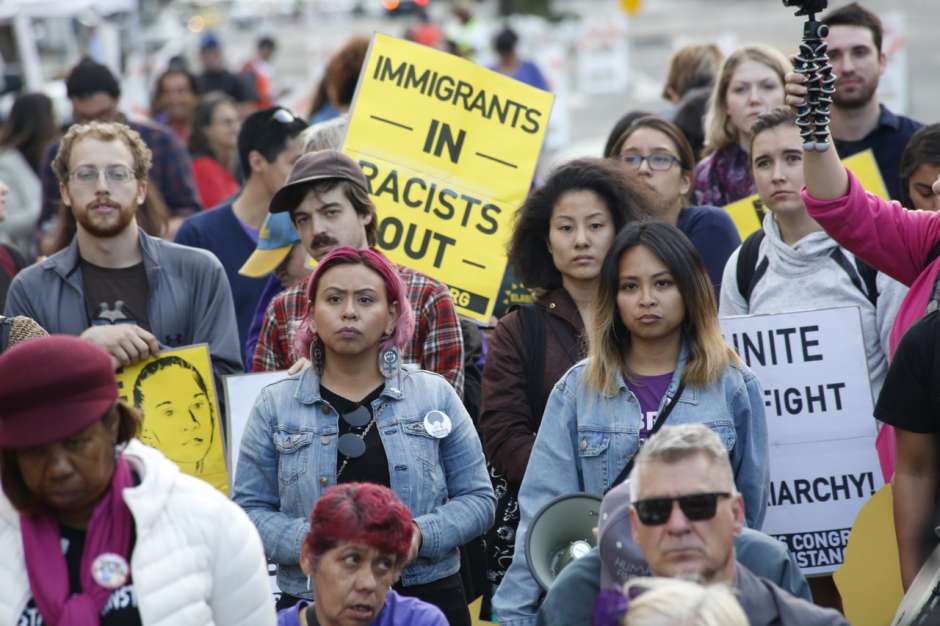
Immigrants in; racists out,” read one of the march’s posters. Photo: Aurelia Ventura
AUTHOR’S VIDEO: https://www.instagram.com/p/BgFhXn4hNrN/
To immigrants like her mother, she told them to be patient, to keep fighting for change. “I am 21 years old and I will help my mother with her papers,”she said.
This young activist was part of the festive demonstration and march that gathered some 300 women in the evening. Armed with banners and blankets with messages against inequality, poverty, violence, criminalization and discrimination, they sang, danced and prayed. The group left the federal building in downtown Los Angeles to walk around a few streets.
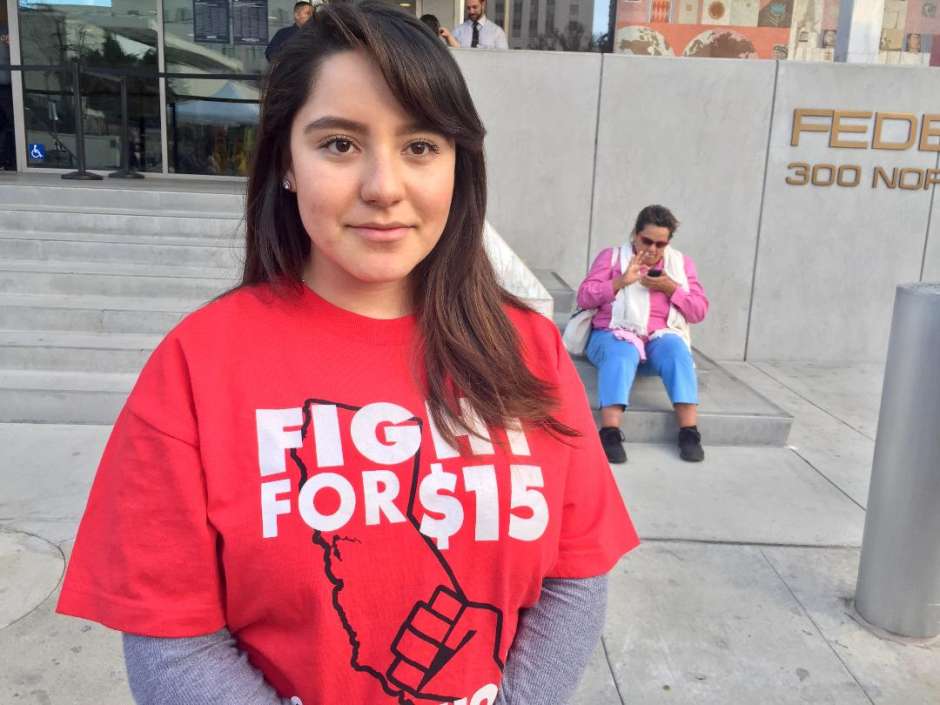
Alondra Becera, a young student and worker who participated in the struggle to raise the minimum wage to $15 per hour in Los Angeles, was one of the speakers on International Women’s Day. (Araceli Martínez/La Opinión).
They are part of a worldwide movement
Angela Sambrano, chairman of CARECEN’s board of directors and immigrant rights activist, said they came together to celebrate women as women from more than 52 countries around the world did.
My message to immigrant women is that we demand a halt to deportations, to the separation of our families and that we stand together and support California’s continued status as a sanctuary so that police and government employees don’t collaborate with the Immigration and Customs Enforcement (ICE),” she said.
And he added that immigrant parents are not likely to be afraid to take their children to school, to the hospital or just go shopping for food. We are struggling to keep our families together,” she said.
Sambrano urged immigrant families not to stop fighting. “Know that you are not alone. We are fighting to ensure due process because only together will we change the racist, xenophobic and patriarchal system that has produced someone like President Trump who doesn’t want immigrants and is only interested in protecting the rich behind the backs of the poor, workers and women,” she said.
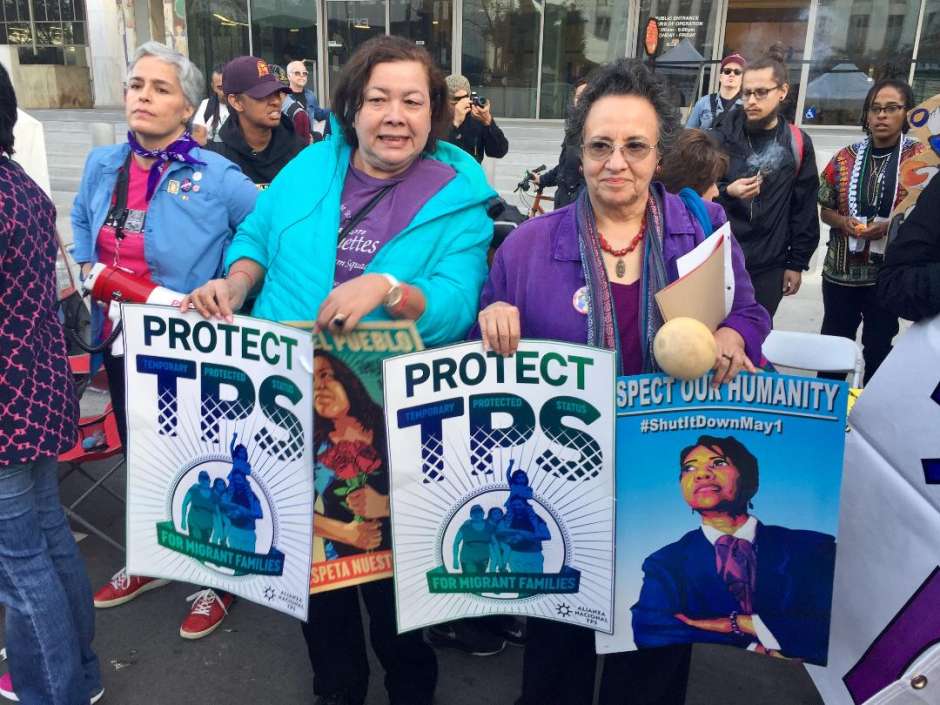
Angela Sanbrano, immigrant rights activist and Edith Anderson Hernandez participated in the march for International Women’s Day. (Araceli Martínez/La Opinión).
TPS holders in the struggle
Edith Anderson Hernandez, an immigrant from El Salvador, arrived at the march with signs alluding to the defense of Temporary Protected Status (TPS), the program that allows Salvadorans and other immigrants to live and work in the country. President Trump set a deadline to end TPS for Salvadorans, September 2019.
“I have a brother, a brother-in-law, my nephews and a lot of family with the TPS. I need my family,” cried Anderson Hernandez without releasing her banner.
She called on TPS beneficiaries not to be afraid and stick together.
“It’s the only way we can make a difference. We are in this country for many reasons. We immigrants bring a very hard story. I left my children under 4,8 and 9 years old to come here so they would be able to eat,” she said.
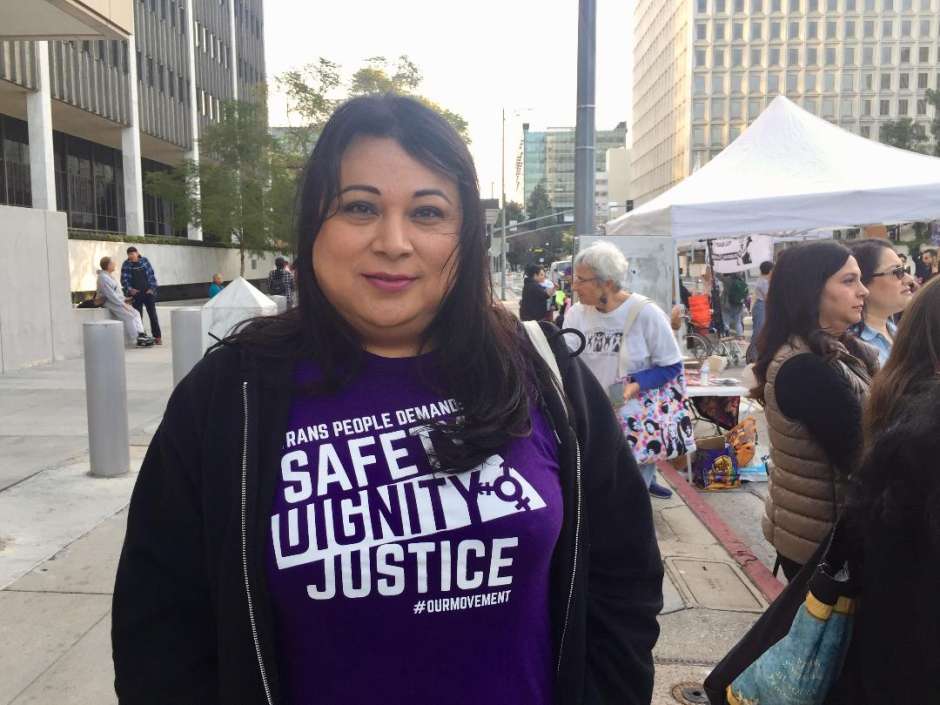
Transgender activist Jennicet Gutierrez of TQLM Family spoke about the injustices suffered by transgender women. (Araceli Martínez/La Opinión).
Transgender Present
Jennicet Gutierrez, a transgendered Mexican immigrant and activist for the Trans Queer Liberation Movement “TQLM Family” had the opportunity to take the microphone during the demonstration.
As a transgendered woman, it is very important to be present to tell compañeras and women in general that we are part of the struggle and we must not tolerate injustice, violence, discrimination and attacks, day after day,” she said.
She stressed that it is important for the voice of transgender women be heard on International Women’s Day because they too suffer a lot of violence, rejection and injustice.
“I want to tell transgender people and all of them that there are strong and powerful women, fighting to stop them from suffering and putting an end to abuses, whether in detention centres, prisons or being rejected by their families,” she said.
Gutierrez stressed that the International Women’s Day march is an opportunity to show unity in resistance. “Go on with all your dignity day by day. We are human beings and deserve respect!”, she said.
Reasons for the Immigration Crisis in Europe
- English
- Español
REASONS FOR THE IMMIGRATION CRISIS IN EUROPE
By Manuel E. Yepe
http://manuelyepe.wordpress.com/
A CubaNews translation.
Edited by Walter Lippmann.
As the migrant crisis in Europe grows ever more precarious, violence between security personnel and immigrants reaches a new level and tension between citizens and non-citizens inches higher and higher. Many European citizens ask in alarm: Where will all this lead? Who is behind this phenomenon? What caused the immigration crisis in Europe and who is –or who are– responsible?
The above are some of the questions on the issue that political analyst Brandon de Turbeville, who specializes in Middle East topics, formulates and tries to answer in an article published by the online magazine Activist Post.
“The immigration crisis has not formed organically nor has it formed in a vacuum. The people attempting to enter Europe over the last few weeks are a diverse lot, but the overwhelming majority of them are fleeing countries where the West, the United States, and NATO, have brought “peace” and “democracy” in the last few years via bombs, troops, or proxy terrorists.”
“The European oligarchs know well that they are responsible for the mass displacement and are working to exploit that displacement to their own ends,” says de Turbeville.
It is clear that Europe cannot continue to accept such unfettered immigration which has already wrought economic and cultural havoc upon a number of European nations. Europeans claim their right to the culture and opportunities to develop their capacities in their own countries as any other human beings in the planet.
Europe has been overwhelmed with massive waves of immigration from Middle Eastern and African nations as well as other “third world” countries, even before the current Syrian crisis.
However, while Europe can logically refuse to allow such waves of unwanted immigration, immigrants themselves have the right to demand an end to the actions that generate the climate of insecurity and death which leads them to escape the hell that the West has visited upon their nations.
Thus, the first step that must be taken to prevent the mass influx of immigrants to Europe –in de Turbeville’s opinion– is an immediate cessation of any and all bombing of Syria. There must be an immediate cessation of support for ISIS, FSA, Al-Nusra, or any other “moderate” terrorist operating in the Middle East. The legitimate Syrian government must be allowed to wipe these terrorists off its territory.
“Syrian immigrants are not going to Europe because they dream of debating gender politics, sipping coffee in French cafes, or kneeling at the feet of the European monarchs. They are going to Europe because their homes have been destroyed, their families have been killed, and their country has been overrun with savages.”
“Thus, Europe may also be well served to assist in the rebuilding of Syria with a comprehensive plan of foreign investment and credit extended from various European central banks. This would have the purpose of rebuilding civilian infrastructure, hospitals, schools, sanitation, roads, and industry. Europe should extend civilized cooperation with Syria in this regard.”
But –according to de Turbeville– European oligarchs do not want to see a peaceful end to the crisis in Syria nor do they desire to see a peaceful and humanitarian end to the immigration crisis. That is why the European people must begin to build coalitions amongst themselves and, indeed, amongst immigrant communities, in order to force them to do so.
The influx of “refugees” into Europe is being used to frighten the European public with images of Muslim fanatics, hordes of people chanting into supporting a bombing campaign against the Syrian government.
Under a number of guises –economic, ethical, etc.– the ruling class has opened the floodgates to immigration from countries whose culture is vastly different from that of the host country and where the majority of citizens of European countries are themselves struggling to make ends meet.
The influx of immigrants has only worsened the economic situation of the European countries who have taken them in, creating another underclass of low wage low-skill workers who are then played off against the indigenous Europeans and earlier-waves immigrants of any origin.
Neither group ever understands that it is the oligarchic element in their societies that have created such conditions at home and abroad and thus turn their pent up anger on one another while competing for job opportunities.
January 17, 2016.
POR QUÉ LA CRISIS INMIGRATORIA EN EUROPA
Por Manuel E. Yepe
http://manuelyepe.wordpress.com/
La crisis de migrantes en Europa aumenta sin cesar y se hace cada vez más precaria la violencia entre el personal de seguridad y los inmigrantes, al tiempo que crece y se hace más tensa la relación entre la ciudadanía y los inmigrantes. Buena parte de los ciudadanos europeos se preguntan alarmados: ¿A dónde conducirá todo esto? ¿Quién está detrás de este fenómeno?, ¿A qué se debe la crisis de inmigración en Europa y quién o quiénes son los responsables?
Las anteriores son, aproximadamente, las interrogantes que, sobre el asunto, formula y trata de responder el analista político especializado en temas del Medio Oriente Brandon de Turbeville en un artículo publicado en la revista digital Activist Post. “La crisis de inmigración no se ha formado orgánicamente ni se ha formado en el vacío. La gente que trata de entrar en Europa en las últimas semanas es muy diversa, pero la inmensa mayoría de ellas huye de países a donde Occidente, Estados Unidos y la OTAN han tratado de llevar la paz y la democracia utilizando para ese fin bombas, tropas o terroristas en años recientes.
“Los oligarcas europeos saben bien que ellos son responsables por el desplazamiento masivo y están trabajando por la explotación de ese fenómeno para sus propios fines” -enfatiza Turbeville.
Es obvio que Europa no puede aceptar tanta inmigración irrestricta que ya hace estragos económicos y culturales sobre algunas de sus naciones. Los europeos reclaman su derecho a la cultura y al desarrollo de sus capacidades en sus propios países, como cualquier otro ser humano en el planeta.
Europa se ha visto abrumada por grandes oleadas migratorias desde naciones del Medio Oriente y África, así como desde otros países del llamado Tercer Mundo, incluso anteriormente a la presente crisis siria.
Pero al igual que Europa puede, con toda lógica, negarse a permitir estas oleadas de inmigración indeseada, los inmigrantes tienen derecho a exigirle el cese de las acciones que generan el clima de inseguridad y muerte que les lleva a escapar de un infierno que Occidente ha lanzado sobre sus naciones.
Así, el primer paso que debe darse para evitar la afluencia masiva de inmigrantes a Europa -en opinión de Turbeville- es el cese inmediato de los bombardeos de Siria y garantizar la suspensión total e inmediata de la ayuda al Estado Islámico, al frente al-Nusra, al Ejército Sirio Libre (FSA), o a cualquier otro supuesto “terrorista moderado” en el Medio Oriente. Debe además permitirse que, con la anuencia del legítimo gobierno de Siria, se limpie de estos terroristas su territorio.
Los inmigrantes sirios no se van a Europa porque sueñen con debates sobre género conversando en los cafés de Paris o arrodillados a los pies de los monarcas europeos. Se van a Europa porque sus casas han sido demolidas, sus familias han sido asesinadas y su país está siendo destruido por salvajes.
“Así, Europa pudiera servir a la reconstrucción de Siria con un plan de inversión extranjera y créditos de varios de sus bancos centrales, destinados reconstruir la industria, los hospitales, las escuelas, los sistemas de saneamientos, las carreteras y la infraestructura civil de la nación árabe. Europa, en este sentido, debe extender una mano de civilizada cooperación a Siria”.
Pero, según Turbeville, “los oligarcas europeos no quieren ver un final pacífico y humanitario a la crisis en Siria, lo que hace necesario que los pueblos europeos, por sí mismos, comiencen a formar coaliciones, entre sí y entre las comunidades de inmigrantes, con el fin de obligarles a hacerlo.
La afluencia de “refugiados” en Europa se usa para asustar a la opinión pública europea con imágenes de fanáticos musulmanes, hordas de personal gritando en apoyo a los bombardeos contra el gobierno sirio.
Llevada por una serie de presupuestos económicos, éticos, y de cualquier índole, la clase gobernante ha abierto las puertas a la inmigración de países cuya cultura es muy diferente a la del país anfitrión y donde la mayoría de los ciudadanos de los países europeos lucha por la supervivencia mes a mes.
La afluencia de inmigrantes ha empeorado la situación económica de los trabajadores de menores ingresos creando, de hecho, una subclase de trabajadores de baja calificación y menores salarios que objetivamente compiten con los nativos e inmigrantes previos menos calificados de cualquier origen y con aquellos de salarios más bajos.
Ninguno de estos dos grupos entiende que han sido los elementos oligárquicos de las sociedades en las que conviven los que, desde el exterior, han creado esas condiciones con el propósito de alimentar la enemistad entre uno y otro bando, en competencia por los puestos de trabajo.
Enero 17 de 2016.
Subscribe to Blog via Email
| M | T | W | T | F | S | S |
|---|---|---|---|---|---|---|
| 1 | 2 | 3 | 4 | 5 | 6 | 7 |
| 8 | 9 | 10 | 11 | 12 | 13 | 14 |
| 15 | 16 | 17 | 18 | 19 | 20 | 21 |
| 22 | 23 | 24 | 25 | 26 | 27 | 28 |
| 29 | 30 | 31 | ||||

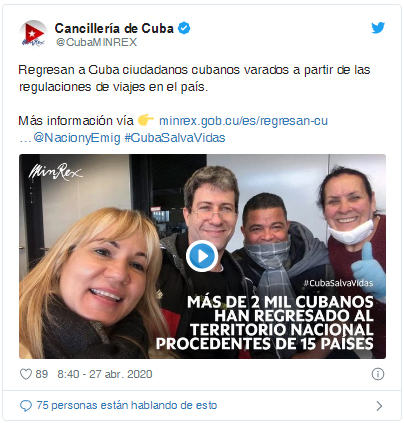

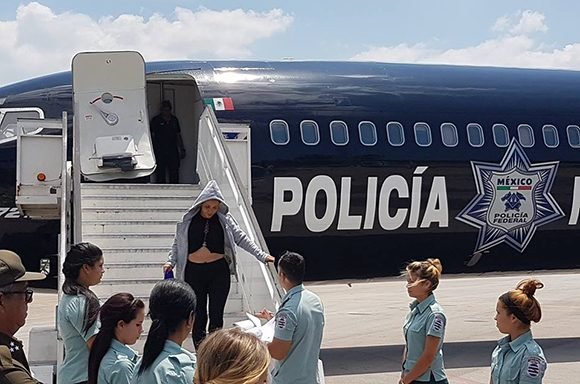


You must be logged in to post a comment.